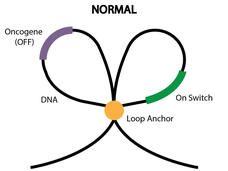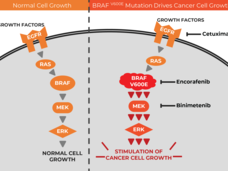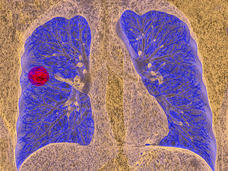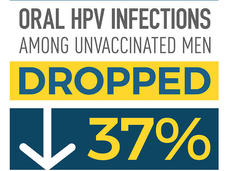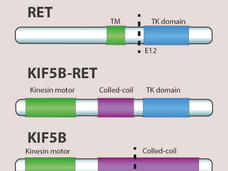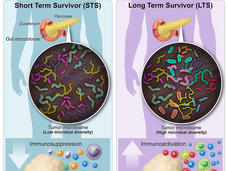Cancer Currents: An NCI Cancer Research Blog
A blog featuring news and research updates from the National Cancer Institute.
-
Children with Acute Lymphoblastic Leukemia Can Skip Radiation to the Brain
Only 1.5% of children with acute lymphoblastic leukemia who skipped radiation had a recurrence in the central nervous system, according to a recent trial. The therapy, which is intended to prevent such a recurrence, can have devastating side effects.
-
Some Brain Cells May Help to Fuel Cancer Metastasis
Brain cells called astrocytes can activate PPAR-gamma, a growth protein in cancer cells that helps them gain a foothold in the brain, a new study shows. The findings suggest that drugs that block PPAR-gamma activity may help treat brain metastases.
-
Epigenetic Changes Pinpointed as the Cause of Some GISTs
Scientists may have pinpointed the cause of some gastrointestinal stromal tumors (GISTs), a rare cancer, according to a new NCI-funded study. However, the culprit isn’t a harmful genetic mutation, but another type of genetic change, what are called epigenetic alterations.
-
Targeted Drug Trio Improves Survival in Colorectal Cancer with BRAF Mutations
For people with colorectal cancer with a specific mutation in the BRAF gene, a treatment regimen of three targeted drugs can improve how long they live without increasing their risk of serious side effects, results from a new clinical trial show.
-
Prescribing Exercise as Cancer Treatment: A Conversation with Dr. Kathryn Schmitz
Updated guidelines on exercise for those living with cancer and cancer survivors were recently released. In this conversation, Dr. Kathryn Schmitz discusses what these new guidelines mean for doctors, patients, and survivors.
-
Home Is Where the Heart Is
Dr. Ned Sharpless discusses his return as NCI director after serving as acting commissioner of the Food and Drug Administration for 7 months.
-
Durvalumab Plus Chemotherapy Improves Survival in Small Cell Lung Cancer
A large clinical trial showed that adding the immunotherapy drug durvalumab (Imfinzi) to standard chemotherapy can prolong survival in some people with previously untreated advanced small cell lung cancer.
-
PARP Inhibitors Show Promise as Initial Treatment for Ovarian Cancer
In three large clinical trials of women with newly diagnosed ovarian cancer, treatment with a PARP inhibitor as first-line therapy, maintenance therapy, or both, extended the length of time before participants’ cancers came back or got worse.
-
Failed Alzheimer’s Drug Might Boost CAR T-Cell Therapy for Multiple Myeloma
Results from a new study suggest a potential way to improve the effectiveness of CAR T-cell therapy for multiple myeloma. The approach relies on a class of drugs called gamma-secretase inhibitors (GSIs), several of which have been studied to treat Alzheimer’s disease.
-
Analysis Shows Women with High Breast Cancer Recurrence Scores Benefit from Chemo
A TAILORx analysis shows women with early-stage breast cancer and high recurrence scores on the Oncotype DX who received chemotherapy with hormone therapy had better long-term outcomes than what would be expected from hormone therapy alone.
-
Dual-Function Virus Engineered to Kill Tumor Cells and Support Immune Cells
Researchers have engineered an oncolytic virus to kill cancer cells and boost the immune response against tumors. In a new study, the virus provided T cells around tumors with a hormone they need for their own cell-killing functions.
-
HPV Vaccine May Provide Men with “Herd Immunity” against Oral HPV Infections
Oral HPV infections cause over 70% of all oropharyngeal cancers in the United States. In a new study of adults aged 18‒59, the rate of HPV vaccination rose from 0% to 6% for men, while oral HPV infections fell by 37% among unvaccinated men.
-
New on NCI's Websites for October 2019
NCI periodically provides updates on new websites and other online content of interest to the cancer community. See selected content that has been added as of October 2019.
-
After a Breast Cancer Diagnosis, Men May Be More Likely to Die than Women
Men with breast cancer may be more likely to die of the disease than women, particularly during the first 5 years after diagnosis, a new study suggests. The higher likelihood of death was linked in part to undertreatment and later diagnosis.
-
Selpercatinib Shows Promise against Lung Cancers with Alterations in RET Gene
The investigational drug selpercatinib may benefit patients with lung cancer whose tumors have alterations in the RET gene, including fusions with other genes, according to results from a small clinical trial.
-
For Children with Neuroblastoma, Trial Results Highlight Continued Evolution of Treatment
For many children with high-risk neuroblastoma, receiving two separate stem cell transplants is more beneficial than receiving one, according to the results of an NCI-supported clinical trial conducted by the Children’s Oncology Group.
-
FDA Approves Entrectinib Based on Tumor Genetics Rather Than Cancer Type
FDA has approved entrectinib (Rozlytrek) for the treatment of children and adults with tumors bearing an NTRK gene fusion. The approval also covers adults with non-small cell lung cancer harboring a ROS1 gene fusion.
-
Pediatricians’ Offices Can Help Parents Quit Smoking, Study Shows
Researchers tested a program that trains pediatricians’ offices to provide smoking cessation treatment to parents during visits with their child’s doctor. The approach is intended to reach adults who are motivated to quit to protect their child’s health.
-
To Treat Pancreatic Cancer, Mouse Study Suggests Altering Tumor Microbiome
In people with pancreatic cancer, the makeup of bacteria that populate their tumors could predict how long they live, results from a new study suggest. Experiments in mice suggested that altering the tumor microbiome could play a role in treatment.
-
For Some Women with Breast Cancer, Cost Influences Decisions about Surgery
In a survey of nearly 600 breast cancer survivors, researchers found that the cost of care factored into the decisions the women made about what type of surgery to get. Many women also reported never discussing costs with their physicians.



